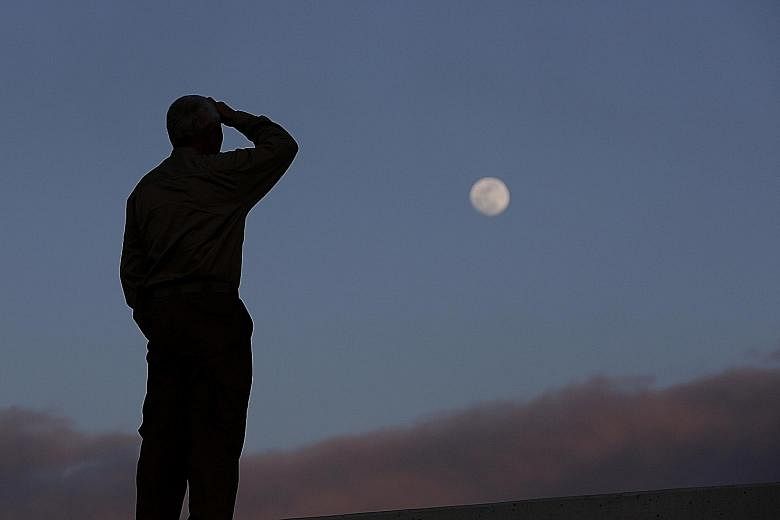WASHINGTON • Dismissed by former US president Barack Obama as a place explorers had already seen, the Moon has once again gained interest as a potential destination under Mr Donald Trump's presidency.
Private sector companies in particular are energised by the prospect of future space exploration missions beyond low-Earth orbit, where the International Space Station circles the Earth.
Mr Trump's close circle and some former Nasa officials have made clear their interest in returning to the Moon by way of partnerships with the private sector.
The early indications are that private rocket companies like Mr Elon Musk's SpaceX and Mr Jeff Bezos' Blue Origin have a clear upper hand in what Mr Trump's transition advisers portrayed as a race between "Old Space" and "New Space".
Some of Mr Trump's advisers worked on the Constellation programme, conceived by former president George W. Bush with a goal to return humans to the Moon for the first time since the US Apollo missions of the 1960s and 1970s.
Mr Obama cancelled Constellation as it was too costly and repetitive, opting instead to work towards new and unexplored destinations like an asteroid and, one day, Mars.
"The people advising Mr Trump on space in a sense are still angry at that and believe it was a mistake," said Mr John Logsdon, former director of the Space Policy Institute at George Washington University.
"If the Trump administration gets out of the current chaos and if their approach to the budget would allow it, I think within the next 12 months, we will see a major space initiative involving a public-private partnership - hopefully international partnership - focused on a return to the Moon," he added.
Mr Eric Stallmer, president of the Commercial Spaceflight Federation which represents the private sector, agreed.
"I think the Trump administration wants to do something big and bold and the Moon is certainly that idea," he added.
Nasa's current focus is on developing what will be the world's most powerful rocket known as Space Launch System.
It will propel a new capsule, Orion, to deep space, one day carrying people around the Moon to an asteroid or even Mars by the 2030s.
"I think you cannot proceed with a mission to the Moon and beyond at this point anymore without a partnership with the commercial industry," Mr Stallmer noted.
Since the space shuttle programme ended in 2011, Nasa has forged partnerships with the private industry, including SpaceX and Orbital ATK, to resupply the International Space Station.
SpaceX aims to start sending astronauts to the orbiting outpost - and space tourists around the Moon - in 2018. It also plans to send an unmanned spacecraft to Mars in 2018, as a prelude to manned missions.
The Washington Post reported that Mr Bezos is working on an Amazon-like delivery service to the Moon. Details circulated to the Trump team and Nasa said the goal is to enable "future human settlement" on the Moon.
Oklahoma Republican lawmaker Jim Bridenstine, who wants to be the next Nasa administrator, has called for a return to the Moon mission as a way to boost needed resources on Earth. Lunar soil is believed to be rich in rare Earth minerals, widely used in electronic devices. And research has shown billions of tonnes of water ice at each lunar pole.
"Water ice on the Moon could be used to refuel satellites in orbit or perform on-orbit maintenance... using liquid oxygen and hydrogen produced from the Moon's water ice," Mr Bridenstine wrote in December.
The Google Lunar XPrize Foundation is also in on the action, with a US$20 million (S$28.2 million) award to the first team to land a robot on the Moon.
AGENCE FRANCE-PRESSE

